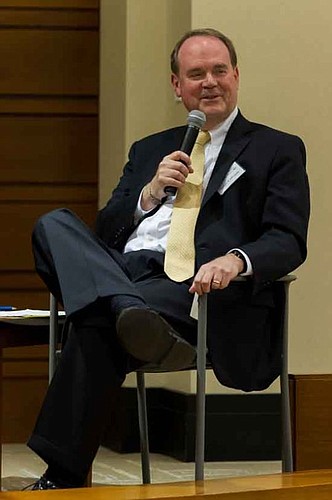
Four years ago, a man desperate not to return to prison viewed U.S. District Judge Timothy Corrigan in the crosshairs of a high-powered rifle scope and pulled the trigger.
The metal casing on Corrigan’s living room window saved his life. The bullet intended for his head hit the metal and ricocheted, missing him by 1.6 inches.
Corrigan’s personal account of the attempted assassination and his professional concerns about remaining impartial while on the bench capped a seminar hosted by the Jacksonville chapter of the Federal Bar Association on April 20.
The man who wanted him dead, Aaron Richardson, is serving 343 years in prison.
His motive? Richardson had gone on a crime spree that violated the supervised parole Corrigan had given him. Those new crimes assured he would go back to prison.
Corrigan said he and his wife, Nancy, were relaxing in their living room June 23, 2013, watching “The Closer” on TV after returning home from a friend’s wedding.
Suddenly they heard an explosion and Nancy hit the ground, shouting, “Tim, it’s a gun.”
In shock, Corrigan said he wasn’t as swift or as sharp.
“I still don’t want to believe what had happened,” he said.
Bloodied by broken glass, and with two bullet holes in the wall, the couple scrambled to an interior room and called 911.
Corrigan said he refused to believe the obvious until a sheriff’s supervisor told him, “Your honor, someone sat outside your window and tried to shoot you.”
For the next six or seven weeks, Corrigan and his wife and two sons lived under the protection of the U.S. Marshals Service.
They were moved to a secret safe house and driven to work, restaurants and shopping centers in a bulletproof SUV with no door handles.
Corrigan described that time as surreal.
“I was just a weird experience,” he said. “It’s a very odd thing for a judge to be a victim.”
With Corrigan’s help, authorities developed a list of anyone who might have had a motive to kill him, including disgruntled civil and criminal litigants.
“It turns out, when you’re a judge that list is pretty long,” Corrigan said.
Eventually the list was whittled down to 50 people, and Richardson was among them.
Then Richardson failed to appear in court on a warrant charging him with the new crimes, which violated the parole Corrigan had given him several months before.
Authorities searched the home of Richardson’s mother and found a .30-06 caliber rifle with a scope that matched up with the bullets at the scene.
They also found a forged court order that Richardson filed to try to erase his criminal past and some surprises on his cellphone. Listed under the heading “Mission Freedom” was Corrigan’s home phone number and Nancy’s cellphone number.
Despite laws that prohibit the publication of law enforcement officials’ addresses and phone numbers, Richardson got them through an online people finder. That information has since been removed.
Authorities also discovered that when Richardson’s first assassination attempt on Corrigan failed, he researched the web for tips to silence the gun and sharpen his aim.
Richardson was arrested within days of the shooting.
Over the course of the investigation and court case, Corrigan continued working. Now a victim of attempted murder, he was experiencing the same frustrations many victims do whencourt proceedings drag on year after year.
His empathy with victims ended there, he said. Concerned about impartiality, Corrigan promised himself that he wouldn’t let the experience affect his handling of cases and sentences.
“I worried about that,” Corrigan said. “I was cognizant of it. I think none of that happened.”
In his victim impact statement, read at Richardson’s sentencing, Corrigan told the court the attempt on his life did traumatize him and his family. But, he said, there was something greater at stake.
“This was an assault on the office I hold,” Corrigan said, reading from his letter on Thursday. “Judges are a personal embodiment of the rule of law.”
A statue of St. Francis now guards the hole in the bushes where Corrigan’s would-be assassin hid.